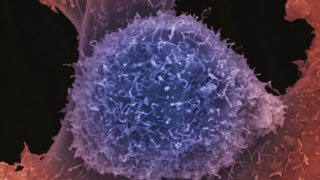Tag: Prostate
Search News
Categories
Archives
Introducing: Dr Alastair Lamb
3rd April 2025
Welcome to our newest group leader, Dr Alastair Lamb.
Read moreBlood test predicts chemotherapy resistance in prostate cancer
11th November 2021
Research conducted at Barts Cancer Institute (BCI), Queen Mary University of London, indicates that regular blood tests before and during chemotherapy for prostate cancer can detect whether or not a patient is resistant or developing resistance to treatment with a drug called docetaxel. Ms Caitlin Davies, a PhD student at BCI, presented the findings from her PhD research at the National Cancer Research Institute (NCRI) Festival, which is taking place from 8-12th November 2021.
Read moreBlood test for prostate cancer
17th September 2019
A new and simple blood test has been found to efficiently and accurately detect the presence of aggressive prostate cancer, in a study led by BCI’s Professor Yong-Jie Lu.
Read moreAR alterations in prostate cancer
16th May 2019
Recent findings from a study published in JAMA Oncology have identified genetic markers within blood samples which may indicate whether patients with prostate cancer will respond to hormonal therapies. The study may represent an important step forward for the development of more personalised treatments for advanced prostate cancer.
Read moreLondon leads the way in advanced prostate cancer research
25th January 2019
Dr Gunnel Halldén is leading a new pioneering study funded by Prostate Cancer UK, as part of the charity’s Research Innovation Awards scheme.
Read moreUsing a modified adenovirus to overcome treatment resistance in prostate cancer
27th April 2018
Researchers from BCI’s Centre for Molecular Oncology, led by Dr Gunnel Halldén, have identified a mechanism by which a modified flu-like virus, called AdDD, is able to negate resistance to a drug called mitoxantrone and increase tumour cell killing in prostate cancer models. This mechanism is dependent on B-cell lymphoma 2 (Bcl-2)- a protein involved in the regulation of cell death (apoptosis).
Read more





